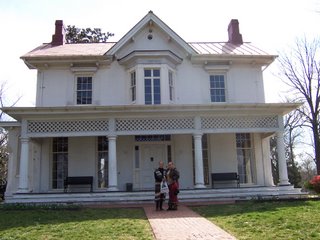
Visit to the home of Frederick Douglas - 1817-1895 ...
The short time spent viewing a brief film on the life and times of this former slave and great American historic figure filled in more of the history that I share with other African Americans. Douglas's life span mirrors that of Celestine Breaux, my great-great-grandmother and Mammá's mother. We don't have a birthdate for her, but I know that she lived at least into the early 1900s since I have a dated copy of a deposition she gave when Leontine applied for widow's benefits as a surviving spouse of a Civil War veteran.
I continue to be amazed at the accomplishments of that generation of ancestors who rose from 300 years of enslavement to positions of national leadership within a decade of emancipation. It's astounding! We are a heroic people whose history has been so blurred that we have no way to profit by that fact, nor to build on the unbelievably rich achievements of our collective past.
Maybe it was the experience of the visit to the Lincoln Memorial together with my everyday experience of working with the Rosie the Riveter/Home Front National Historical Park that produced new insights. I'm increasingly aware of patterns in the political life of the nation that span time and are reproduced, intermittently, over time. Maybe one has to attain enough years to begin to see those patterns.
Thought of Frederick Douglas's role in the story of Lincoln. Thought of Henry J. Kaiser and his relationship to a particularly controversial quote uttered by the great emancipator in 1862 -- at the height of the War Between the States. These words were written in a letter to Oliver Wendell Holmes:
"My paramount object in this struggle is to save the Union, and is not either to save or to destroy slavery. If I could save the Union without freeing any slave I would do it, and if I could save it by freeing all the slaves I would do it; and if I could save it by freeing some and leaving others alone I would also do that. What I do about slavery, and the colored race, I do because I believe it helps to save the Union; and what I forbear, I forbear because I do not believe it would help to save the Union. I shall do less whenever I shall believe what I am doing hurts the cause, and I shall do more whenever I shall believe doing more will help the cause."
On the flight home I thought of Henry J. Kaiser, the great industrialist, who might have chosen to paraphrase Lincoln's statement to read:
"My paramount object in this war is to save the nation and the world, and is not either to save or destroy social mores that I may find egregious. If I could save the Nation without forcing black and white Americans to share drinking fountains, public accommodations, housing, childcare, or union memberships, I would do it; and if I could save the nation and win the war by softening some barriers and leaving others in place, I would do that. My job is to build ships faster than the enemy can sink them. That I will do. We'll sort out the rest when the work is done."
And he did; seven hundred and forty-seven ships in four years. Some were completed in four days. These words mimicking Lincoln's statement are a fantasy, of course, but may be descriptive of Mr. Kaiser's intent. The record of Kaiser Permanente in subsequent years since World War II would attest to the honorable intentions of that corporation as surely as Mr. Lincoln's future course revealed his compassion for those living troubled lives as dehumanized "property" of others.
Mr. Lincoln's freeing of the slaves lit the fires under the cauldron of social change in an explosion of revolutionary political activism that preceded the tumultuous and cruel period now known as "The Reconstruction." Mr. Kaiser's domination of industrial innovation during World War II provided the next great phase in social development, if only as an unintended consequense. In the Richmond shipyards during those years -- despite the importing of racial segregation from those southern states from which homefront workers were recruited -- the baseline was laid for monumental new social patterns. Until that time the old racist practices -- long legislated into the laws of the land -- had defeated all efforts at solving the crippling problems of racial segregation. As a direct result of his "lighting of the fires under the cauldron of social change" in his time, he accelerated the nation's confrontation with it's shameful past. That history is recalled as The Civil Rights Revolution of the Sixties.
I was recently a guest at the 60th anniversary celebration of the Kaiser Permanente Corporation in Richmond. I was greatly impressed to hear the president of that organization comment during his brief remarks that Kaiser can boast that their workforce -- both administrative and professional -- is now 52% non-white, a clearly representative example of the nation's ever-changing demographics.
President Abraham Lincoln, Mr. Henry J. Kaiser, and Mr. Frederick Douglas would have been proud of how far we've come, though Dr. Martin Luther King and Ms. Fanny Lou Hamer might admonish us for not having come quite far enough, but I'm certain that we're working on it with diligence.
Our developing park will serve to remind us from whence we've come while giving some measure of just how far we still must travel before we sleep ... .
I'm so proud to be a part of that work.
No comments:
Post a Comment